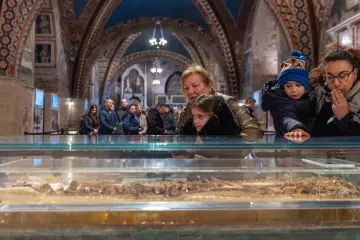Lord’s Day Reflection: The sadness of things
By Abbot Marion Nguyen
God’s Word offers us a piercingly sober lens through which to view one of the most common illusions of our time: the promise of happiness through the accumulation of things. Our culture, saturated by advertising and consumerism, teaches us to associate joy with possession, fulfillment with acquisition. We are subtly taught that if we just had more—more money, more space, more recognition, more control—then we would finally be at peace. But today’s readings confront this illusion with painful clarity.
Qoheleth speaks with wearied disillusionment: “Vanity of vanities! All things are vanity! … For what profit comes to man from all the toil and anxiety of heart with which he has labored under the sun?”
He has tasted what the world promises will satisfy—and finds it empty. His voice is not bitter, but honest: toil driven by endless desire leads only to sadness and alienation.
In the Gospel, Jesus names the same root sickness in the man who cries out, “Tell my brother to share the inheritance with me!”—a cry not of justice, but of possessiveness. Jesus refuses to arbitrate; instead, He exposes the deeper issue: “Take care to guard against all greed, for though one may be rich, one’s life does not consist of possessions.”
What a devastating statement. One’s life—the vitality and meaning of who we are—does not consist of what we own. And yet how often do our choices, our fears, and even our relationships suggest otherwise?
The monastic tradition has long taken avarice—this inordinate desire to possess—very seriously. Saint Antony of Egypt, the father of Christian monasticism, was stirred by Jesus’ words to the rich young man: “Sell what you have, give to the poor, then come, follow me.” That young man walked away sad, because he had many possessions. Antony, by contrast, let go of all to follow the One his heart truly sought (cf. Ps 27:8).
Building on this wisdom, Saint Benedict writes in Chapter 33 of his Rule: “This vice [of private ownership] must be uprooted completely from the monastery.”
Why such severity? Because Benedict, like Cassian and Evagrius, understood that avarice is not about money—it’s about the heart. It shows up in hoarding wealth, but also in clinging to trifles, worrying about the future, justifying selfishness, or refusing to share. Cassian observed how even monks might cling tightly to a single item—as if their life depended on it. Avarice makes the heart restless, anxious, and sleepless—not because it lacks, but because it does not trust. And this is the deeper tragedy: avarice ruptures relationships. In today’s Gospel, the man isn’t mourning his father’s death; he’s fighting with his brother. Desire becomes division.
This vice touches all of us. But the Desert Fathers taught that its remedy is not guilt or harshness, but detachment born of love. It is the freedom that comes from knowing we are already provided for—even before we ask (cf. Mt 6:8). It is the joy of sharing, the humility of depending on others, the peace of living simply.













